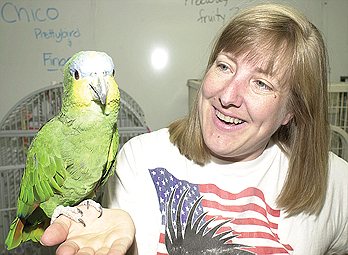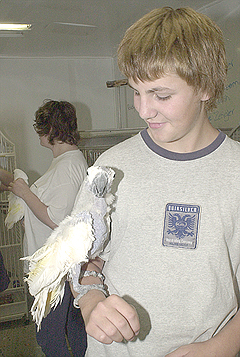|

Mollywood Avian
Sanctuary co-founder Betsy Lott plays with Blue, a 15 year old Orange Winged Amazon
from California. Lott said every hook-billed bird is on one of the lists for endangered
species, even parakeets.
Christina
Hallock
Lynden Tribune reporter
 |
Volunteer
Troy Huartson, 14, plays with one of the sanctuary's "signature" birds,
a pink moluccan parrot. Owner Betsy Lott said parrots really enjoy being with
other parrots and dislike being alone. |
Sanctuary's oldest bird
is a 52-year-old retired breeder. Betsy Lott gently reaches into an oversized
white cage for Beeba, a light pink moluccan parrot that has plucked off more than
half of her own feathers. As Beeba sits on Lott's arm, a moluccan in the next
cage begins squawking like crazy. "That's Romeo," Lott said. "He's
the only fully-feathered bird who loves Beeba." Lott places Beeba in with
Romeo and he immediately begins fluffing his feathers for the female visitor.
"He's just looking for trouble," Lott smiles knowingly.
Such is the day-to-day
life at the Lott home for Betsy and her husband, Nate, and their brood of nearly
200 cockatoos, parrots, parakeets, lovebirds and other hook-billed wordy birdies.
The couple operates the Mollywood Avian Sanctuary in Everson and tends to the
physical, emotional and social needs of the birds, most of which have been rescued
from breeders and abusive homes. "People buy these birds and don't know the
commitment they take," Lott said. "A parakeet can live 10 to 20 years.
A macaw can live for more than 60 years."
The Lotts' unplanned parrot-hood
came about 10 years ago in late October while living near San Jose. When neighbors
across the street were going to let their two parakeets go free, the Lotts spoke
up and became "parents" for the first time. About two years later, they
purchased a young parrot through a newspaper ad. A few months later, they saw
a macaw at a feed store and took it home.
The bird-loving couple
began reading about taking care of the exotic creatures. Over the next several
years, they inadvertently got involved with parrot rescue, going from owning 12
birds in 1996 to 92 birds by January 2001. "I had planned on early retirement,"
Nate Lott laughed. "But this has really changed my world view. It's time
to do something good."
In October, the Lotts
moved their flock of 131 to a roomier, affordable home in Everson so Betsy could
stay at home and care for them. The Northwest climate is good for the birds, and
there are very few parrot rescue programs in this region. "There are 60 million
exotic birds out there for only 7.1 million homes," Lott said. "A market
cannot sustain that."
Although a 1992 import
ban keeps exotic birds from coming into the United States, ongoing breeding and
the longevity of some breeds still creates a glut on the market. Some birds are
simply without homes or find themselves with a frustrated owner who didn't expect
the expense or time these birds require.
Morgan is a moluccan rescued
from an owner who wanted to put the bird to sleep to not have to pay for a veterinary
bill. He was also beaten with sticks. "Morgan eats breakfast with me every
day," said Del Rita Dussell, the sanctuary's "number one" volunteer
and Betsy's mother, who lives with the Lotts. "I'm grandma bird."
Dussell is also grandma
bird to poor Sara, a moluccan who was purchased to be an "ornament"
at a bed and breakfast, Lott said. "They found out that she was loud and
messy, so they put her in the basement," Lott said. "She was alone by
herself, so she plucked all her feathers off. When she was done with that, she
ate her toe off." A new employee to the establishment found Sara and turned
her over to the Lotts. That's the way many of these colorful creatures come, without
feathers or toes and feeling insecure.
At one point, the Lotts
tried to find adoptive homes for the hook-bills, but all the large birds they
adopted out came back, no matter how much the Lotts educated families about their
care, Lott said. For now, the Lotts simply enjoy the mix of personalities that
make up such a large family, even Fred, who is nicknamed "Professor Pottymouth."
He was owned by an older man who was developing Alzheimers and cursed frequently.
Another parrot who came
to the Lotts because of a couple's divorce repeats the squawk "I pay the
bills" and once caused Nate's parents to question if the Lotts were having
marital problems. As Budda, "Daddy's Girl," hops upstairs looking for
Nate, eight other "children" take their turns on perches in the living
room and kitchen squawking to their delight -- and the Lotts don't even seem to
mind.
"Everyone speaks
their own language very well," Lott said.
Volunteers, donors keep
Mollywood flying
Christina Hallock
Lynden Tribune reporter
Donors can sponsor a bird
to help keep the Everson safe haven running. Nearly 200 hook-billed species of
birds are cared for in the Lotts' Everson home in two garages and throughout their
living quarters.
Each large bird stays
in its own oversized cage and enjoys plenty of fresh fruits and vegetables, pellet
food and toys. Smaller birds congregate in an outside aviary. But it takes the
commitment of volunteers and donors to keep the operation going smoothly.
"Even a parakeet
costs $100 for a checkup at the vet," Betsy Lott said. "We spend about
$15-20,000 a year on vet bills alone."
She said that, even after discounting, the daily fresh and frozen fruits and vegetables
for the birds cost about $900 a month. Pellets and small seed cost about $700.
Buying cages is what really strains the budget, Lott said.
The bigger birds are brought
out of their cages daily by the Lotts and volunteers and are held or given the
opportunity to fly a bit. They are rolled outside in their cages on sunny days
and sprayed with a light mist of water for a bath. "Some people say we're
warehousing our birds, but this is not our plan for them," Lott said.
Aside from the day-to-day
expense, the Lotts are trying to raise funds to build a large two-story indoor/outdoor
aviary where the birds can fly freely with one another. "These are flock
animals by hardwire," Lott said.
She hopes to eventually
open the non-profit sanctuary as an education center where visitors can observe
the birds.
There is still a large
need for volunteers and donors at the sanctuary. Lott said she needs an office
manager to help organize and apply for grants. Volunteers can also learn how to
make time-consuming parrot toys, clean cages, cut up the daily produce or just
visit with the birds.
Kathie Huartson of Lynden
and her 14-year-old son, Troy, have been volunteering regularly since December.
They change paper on the bottom of cages, fill food bowls and play with the birds.
"I thought it would be a good learning experience for us with our birds,"
Kathie said. "And this way, we can help take care of the birds without really
owning them. "It's kind of a bonding thing for us," she said, pointing
to her son.
There is also a need for
people with electrical, welding and plumbing skills to assist with the large aviary.
Materials like fir and maple wood, weld wire, the root balls of birch and alder
trees, square tubing and chain link fencing are needed. "Even PVC can be
helpful," Lott said.
Over the long term, Lott
said, she hopes the sanctuary will run itself, with a steady list of volunteers
and small admission fees helping to pay for upkeep. "We just want the birds
to be happy, to just let them be birds," Lott said.
For more information on
how to help, call Mollywood Avian Sanctuary at 966-7490 or visit www.mollywood.net.
Copyright © 2003
Lynden Tribune. All rights reserved.
P.O. Box 153, 113 N. 6th Street, Lynden, WA 98264 USA
phone: 360-354-4444
FAX: 360-354-4445
tribune@lyndentrib.com
Reprinted
from Lynden Tribune - Tuesday, August 12, 2003 |